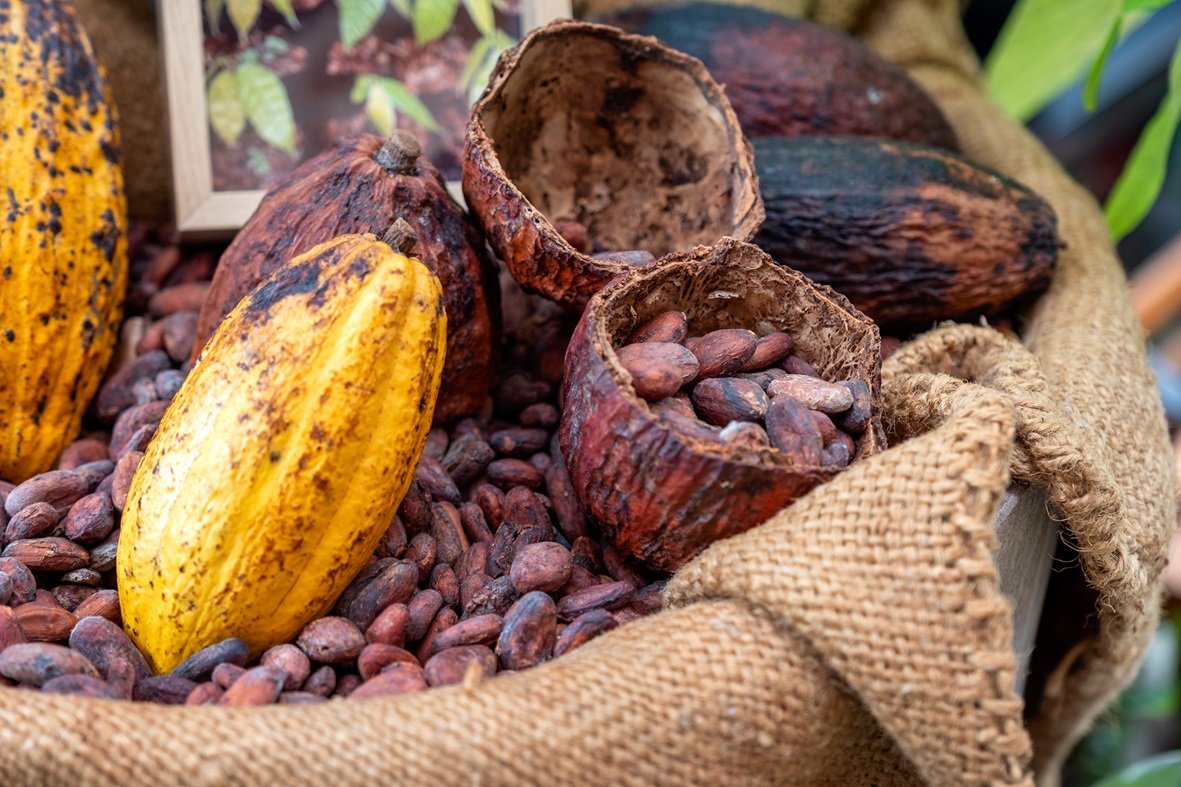Dr. Oetker Stories
Cocoa that is better for people and nature
What do tree frogs have to do with brownies or chocolate mousse? Cocoa is required for the recipes, most of which comes from West Africa. Tree frogs live in the rainforests there - and they are the symbol of the Rainforest Alliance, an organization that advocates more sustainable cocoa cultivation.

22.9.2022 • Sustainability
Worldwide nearly five million tons of cocoa are harvested each year* – the popular ingredient for desserts and pastries is a sought-after raw material. Eva Maria Flach and Ildikó Fegyveres work at Dr. Oetker to ensure that almost exclusively Rainforest Alliance Certified cocoa is purchased for the products.
A frog as an indicator: for cocoa that is better for people and nature
The cocoa industry faces social, economic and environmental challenges: Climate change, deforestation, low incomes and poor working conditions are just some of the issues affecting cocoa farmers and nature. The tree frog in the seal of the Rainforest Alliance symbolizes a better future for people and the environment. Because: The large-eyed frogs are so-called indicator animals - their presence is a sign that an ecosystem is balanced.
The Rainforest Alliance has been working for a better future for people and nature worldwide for over 35 years. Together with its partners, it protects forests, improves the living conditions of agricultural and forestry farmers and strengthens their human rights. It also supports cocoa farmers in resolutely combating the climate crisis and preparing for its consequences. The organization only awards the seal with the frog to those farms, producer cooperatives and supply chain organizations that meet all of its applicable requirements.
In total, the Rainforest Alliance works with more than 6,000 companies and 4 million farmers in nearly 60 countries. The seal means that a product has been produced by farmers, foresters or companies working together to create a world where people and nature live in harmony.
There are already 54,000 products in 190 countries that carry the Frog Seal (or the UTZ label). With Rainforest Alliance certification, Dr. Oetker is contributing to the goals of the United Nations Sustainable Development Goals.
Dark or ruby chocolate? For both products, Dr. Oetker buys Rainforest Alliance-certified cocoa.
A good decision for people and nature: Follow the frog!
A frog seal from the Rainforest Alliance can also be found on the Dr. Oetker decor product that Eva Maria Flach, Senior Quality Manager International, is holding in her hands in her office in Bielefeld. At Dr Oetker, she is responsible for ensuring that the requirements of the Rainforest Alliance are implemented at the relevant Dr. Oetker locations worldwide. Her colleague Ildikó Fegyveres, Purchasing Manager at Dr. Oetker in Hungary, is responsible for purchasing cocoa, among other things. Together, the two of them ensure that cocoa is sourced as exclusively as possible from sustainably certified cultivation in accordance with the Dr. Oetker Sustainability Charter. "What we value most about the Rainforest Alliance as a partner is that their standard takes social, ecological and economic aspects into account," explains Flach.
To raise consumer awareness of the purchase of products with sustainably certified cocoa, Dr. Oetker is supporting the Rainforest Alliance's "Follow the Frog" campaign every year internationally with communication measures. Currently, not all of the Dr. Oetker products bear the frog seal, although almost exclusively Rainforest Alliance Certified cocoa is purchased for most products. With the upcoming relaunches of packaging worldwide, this will be increased in order to provide consumers with transparent information directly on the packaging of as many products as possible.
Ildikó Fegyveres buys cocoa in different shades for different recipes from Dr. Oetker - this one is almost black.
Cocoa in a wide variety of shapes and colors
Today, the most important cocoa growing regions are in West Africa - in the Ivory Coast and Ghana. More than three quarters of the world's harvest is produced there. Côte d'Ivoire alone harvests over two million tons of cocoa annually. This makes it by far the most important cocoa-growing country. “We at Dr. Oetker, for example, directly purchased around 8,500 tons of cocoa powder for our cakes and desserts worldwide in 2023 alone. In addition, there are other quantities of raw materials containing cocoa, such as cocoa butter or nibs, or those that have already been processed into drops, sauces or sprinkles - from ruby to white to plain,", explains Ildikó Fegyveres.
Before processing into cocoa beans, cocoa powder, drops, sprinkles or sauces - this is what cocoa pods look like.
Dr. Oetker grants newly acquired companies a transition period of three years when switching to Rainforest Alliance Certified cocoa with a view to existing supply contracts. In some cases, very specific cocoa-containing raw materials are required in small quantities, which only a specific supplier can supply. This supplier must first be Rainforest Alliance Certified in order for the raw material to be considered as certified - here, too, Dr Oetker allows time-limited exceptions. "Rainforest Alliance certification also ensures compliance with internationally recognized human rights in accordance with applicable laws. This also includes the prohibition of child labor," adds Fegyveres. In addition, most of the suppliers demonstrably have their own programs to promote sustainability in the cultivation and production of cocoa.
*Source: Statista. Harvest year 2022/2023, International Cocoa Organization
For more information please contact:
Katharina Ahnepohl
Media Spokesperson Sustainability